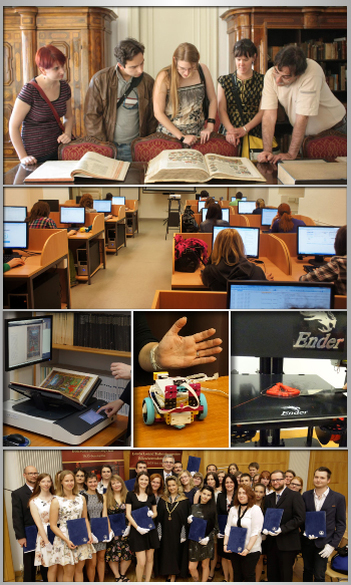Institute

Our Mission
In this day and age of fake news and distrust in science, reliable information has become all the more crucial.
From the beginning, it has been both the mission and responsibility of library and information science to provide credible and systematised knowledge about the past and present. As a form of institution that has been around for thousands of years, the library is no longer just a repository of books: documents, information, print and digital content have become an integral part of everyday life – thus, the library has emerged as a digital facility while still fulfilling the role of a vibrant cultural institution, a community space and a service centre essential to the work of researchers and professionals.
Librarians are therefore responsible for developing and operating a system that is not only more comprehensive, reliable and personalised than the internet, but is also available to everyone: from the children to the elderly, from academic researchers to business leaders, from those who want to educate themselves to those who want to educate others.
All around the world, libraries are reinventing themselves as community hubs, but the Covid-19 lockdowns also demonstrated that librarians are indispensable. Moreover, the lockdowns also demonstrated that online library services with up-to-date databases and remotely accessible digitalised scientific and cultural heritage are integral parts of global library networks.
It is our common mission to enable students to organise and provide information in a structured way. Our graduates provide an opportunity for all members of society to access knowledge. By providing conventional documents along with digital content and databases, they are able to share knowledge both in the virtual space and the largest cultural institutions while working in the ubiquitous community hubs known as libraries.
The Programme
Library and Information Science (LIS) is perhaps the most flexible field of study, due to its adaptability to technological and social changes. In the most beautiful institute of ELTE’s Faculty of Humanities, students are able to master both the theory and practice of LIS through internships, visits to institutions, international programmes (such as Erasmus) as well as professional and recreational programmes.
The programme’s interdisciplinary nature allows students to explore numerous exciting scientific fields. By both cherishing and complementing the traditions of the ELTE Faculty of Humanities, students gain proficiency in the following aspects depending on their field of interest:
- All aspects of the written heritage, from codices and old printed materials to the publishing industry today;
- The importance of communication channels, from the early years of the press through the golden era of electronic communications to digital media;
- Knowledge repositories and databases, research and information services;
- Knowledge systemisation with the philosophical and epistemological questions of classification, cataloguing and meta data;
- Information technology, digitisation, database building;
- Online presence and social networks;
- The principles of management, business and law.
Founded in 1949, Hungary’s first Library and Information Science university course can draw on more than seven decades of experience as well as its unique national and international network to develop its educational programme.
We are the only place to offer a full range of library and information science courses:
- BA in Library and Information Science, with two specialisations (library history, information and knowledge management);
- MA in Library and Information Science;
- Librarian Teacher Training (OTAK);
- Short-cycle Librarian Teacher Training (RTAK);
- Bachelor of Music, Culture specialisation in music librarianship;
- Doctorate in Library Studies (PhD).
Cooperation and research
In addition to the necessary competences, we also provide our students with insights, professional contacts, publication opportunities and, in many cases, direct career opportunities.
Our cooperation agreements provide:
- professional contacts;
- new technology that can be demonstrated;
- thesis and research topics that meet the needs of the profession, and publication opportunities;
- and in many cases, direct career opportunities.
Our courses are conducted on an almost dual basis with our cooperation partners, and work placements in external training centres are a key part of the programme.
Invited guest lecturers and presentations by leading national and international experts play an important role in the education we provide.
Thanks to our more than 20 Erasmus partners, our students have the opportunity to gain work experience in various countries.
Students can also participate in an active interdisciplinary research workshop at our institute. From book and library history to networked collection development and professional business information management, our research covers all the exciting and now vitally important areas of 21st century library and information science.
- We produce digitised thematic collections.
- We participate in joint research with our cooperation partners.
- We organise and edit the largest national library and information science conference and book series.
- We also organise a series of ‘Open Days’ (Nyitott Napok) for the public.
- We organise visits to institutions every semester.
- Guest lecturers from abroad and at home enhance our educational offer.

